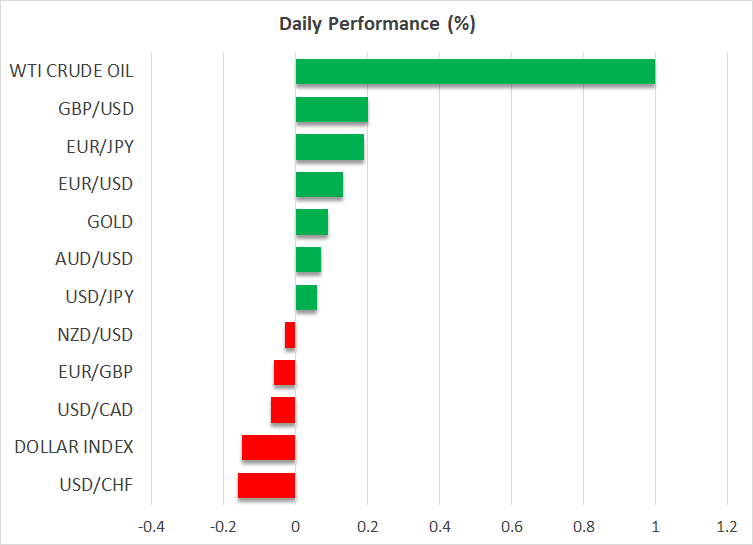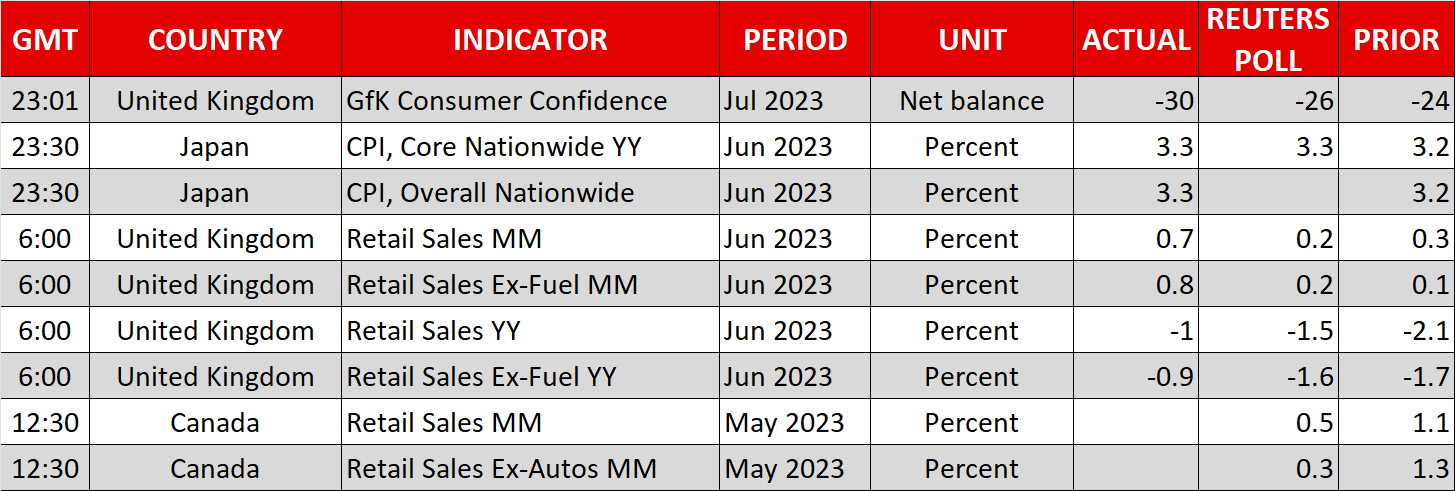- Strong jobless claims revive higher for longer bets for the Fed, buoying the dollar
- Upbeat data also come to pound’s aid, but yen slips as expectations for BoJ surprise fade
- Dow Jones and Nasdaq go their separate ways on mixed earnings amid tech selloff

Markets suffer another reality check
Investors pared back their expectations that the Federal Reserve will embark on an aggressive rate cutting campaign next year after yet another solid jobless claims print on Thursday. Claims for unemployment benefits in the United States fell to 228,000 in the week to July 15, casting doubt on the notion that a drop in inflation alone would be enough for the Fed to ease up its fight against rising prices.
Rate hike odds for the remainder of the year edged up slightly after the data, while traders now anticipate fewer cuts in 2024. The moves weren’t dramatic but underline the risks heading into next week’s FOMC meeting. The Fed is widely expected to hike rates by 25 basis points, with markets still believing that this will be the last even though the message from Chair Powell of a further similar-sized increase is unlikely to change.
However, the outlook remains extremely murky and the Fed may yet end up following the markets’ expected rate path as apart from the strong labour market, other data released this week on manufacturing and housing were less than stellar.
Dollar extends gains, pound decline steadies, yen plunges
The US dollar, which had already started to recover from its post-CPI selloff, jumped higher after the job figures, mirroring the spike in Treasury yields. The greenback slumped to 15-month lows against a basket of currencies after the June CPI report sparked a massive repricing in Fed fund futures. Whilst the dollar index clearly remains within a bearish trajectory, the road south will be a bumpy one to say the least as the hot labour market could still spoil everything for the dollar bears.
But the dollar wasn’t the only currency receiving a leg up. The British pound managed to slow its slide after UK retail sales grew more than expected in June. Although the June inflation report was a game-changer for the interest rate outlook in the UK, the Bank of England’s credibility is at stake if it doesn’t manage to get a grip on sticky core inflation. Hence, as long as economic growth indicators remain fairly upbeat, the BoE will have little excuse to pause its tightening cycle early.
But in the short term, the pound’s woes may persist given where the markets’ expected terminal rate for the BoE stood prior to Wednesday’s soft CPI numbers.
Another currency coming under pressure this week has been the yen. The dollar’s rebound has cut short the yen’s attempt to recoup some of its heavy losses from recent months. Exacerbating the renewed selloff were remarks from Bank of Japan Governor Ueda earlier this week downplaying the prospect of an imminent shift in ultra-accommodative policy at next Friday’s meeting.
Stocks headed for subdued end to the week
Higher bond yields weighed on equity markets while China’s measured response to dealing with stalling economic growth continued to unimpress investors. Beijing announced new steps on Friday to boost consumption for certain goods such as cars and home appliances but domestic shares nevertheless closed slightly in the red. More details may be forthcoming when the Chinese Communist Party’s executive arm Politburo meets at the end of the month.
Stocks in the US ended Thursday mixed, with the S&P 500 and Nasdaq Composite closing lower, while the Dow Jones bucked the trend to finish higher. Traditional stocks outperformed on the back of better-than-expected earnings, including from Johnson & Johnson and Travellers, lifting the Dow Jones.
Airlines and financials rose as well, but tech stocks came under fire amid a somewhat delayed reaction to Netflix’ and Tesla’s disappointing earnings results this week. Risk sentiment soured after the jobless claims figures and Taiwan Semiconductor Manufacturing Company reporting declining gross margins didn’t help either.
It remains to be seen whether this is simply a bit of profit taking and the next round of Big Tech earnings from the likes of Microsoft (NASDAQ:MSFT) and Alphabet (NASDAQ:GOOGL) on Tuesday will be able to turn things around, or if this is the start of a deeper correction.
